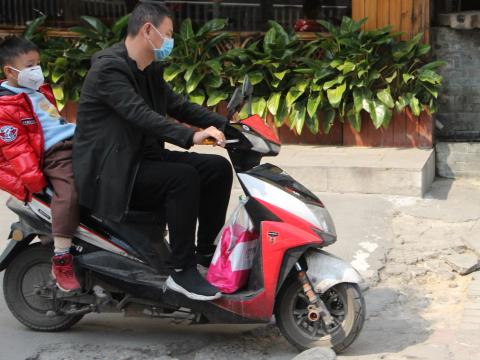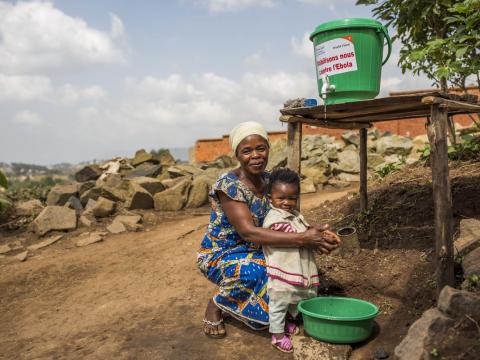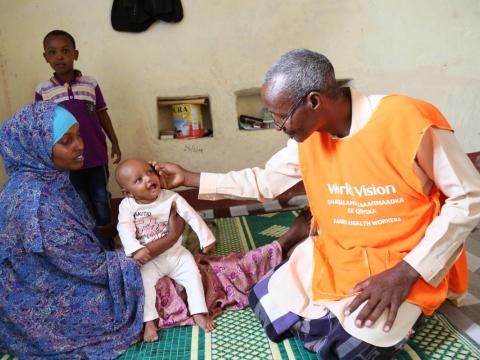
To keep children safe from coronavirus, we must act on what we’ve learned.
By Tom Davis, World Vision’s Global Lead for Health & Nutrition
As the coronavirus spreads, the world is watching to see if humanitarian agencies like ours have learned from past experience. In the last decade my organisation, World Vision, has witnessed the devastating and debilitating impact of Ebola in West Africa and DR Congo, the worldwide H1N1 pandemic, and Zika in Latin America.
As a community-based organisation whose staff members mostly come from impacted communities, my colleagues aren’t just helping suffering strangers. Those men, women and children affected by disease outbreaks are often friends, neighbours, colleagues, family.
Thankfully good can come from such tragedy. With each killer disease, agencies like ours have learned important lessons about epidemic response. Affected countries also learned from the pandemics and have improved resources and support to strengthen their health systems, thereby guarding against future threats. Many health systems, however, are still too fragile to effectively manage disease outbreaks.
So, as coronavirus makes its way across Asia to the rest of the world, we sadly know what’s coming if countries with strong health systems and major resources don’t help those countries that are still weak and that request support.
Without sufficient funding and health expertise from better-resourced countries, vulnerable people and those with fragile health who live in places with inadequate health systems won’t have the access to the up-to-date and accurate prevention messages, assessment, and case management that they need. Where there are already high rates of malnutrition, malaria, HIV and AIDS, tuberculosis and diarrhoea, people will be more susceptible to the virus.
More and more people will get sick. Some will die. And that is only the beginning. It appears at this point that coronavirus is more likely to target adults. This, of course, includes parents and, in particular, grandparents, who can often serve as important caregivers of young children. When family members are sick and cannot work or put food on the table, children are at a higher risk of malnutrition, diarrhoea and other killer diseases.
When parents and grandparents die, children, particularly those in fragile contexts, can be left to fend for themselves and become vulnerable to many forms of violence, abuse and exploitation, including having to sell sex just to survive.
Also, as health systems become overwhelmed by a spike in cases of this new and serious disease, they may well divert their time and resources away from the routine interventions that keep young children healthy and safe from harm.
Given everything that World Vision has learned from our staff, partners and communities about the spread and impact of diseases like coronavirus, we are calling for three things to help protect children in vulnerable countries:
- Countries that have strong health systems and economies must help those that haven’t. Without this support, the world’s poorest people will remain at higher risk of contracting coronavirus disease and outbreaks may prove especially devastating. If those requests for support fall on deaf ears, the disease will also be more likely to spread to more and more places.
- Governments should consistently invest in training community health workers as front line workers to address this crisis. In countries where getting to formal health facilities is difficult, community health workers are a trusted cadre of local people who can deliver health messages and services, refer patients, and gather vital data about diseases for national and global use – especially when a disease like coronavirus strikes.
- Governments should recruit local faith and community leaders to deliver health messages, and truly listen to community members. Experts agree that one of the most important steps toward building trust is community engagement[1]. We have seen that community engagement via trusted leaders can be instrumental in slowing the spread of diseases like coronavirus. By training priests, pastors and imams how to share crucial health messages with their communities, World Vision helped combat previous Ebola outbreaks. We discovered that by listening to community members using formative research tools[2], governments and organisations like ours can better understand why people do and do not adopt practices that can save lives (e.g., handwashing with soap and prompt referral of cases).
As more and more cases of the coronavirus are announced, we need to remember what we have learned from our partners and the communities that we have served during past public health emergencies. Only that will allow us to get the right things in motion quickly to help save as many people as possible and to protect the lives and wellbeing of vulnerable children.
[1] See page 5: https://www.who.int/risk-communication/guidance/process/Final-Report-Executive-Summary-Rapid-Grey-Lit-Review.pdf?ua=1
[2] For example, Barrier Analysis: See https://www.fsnnetwork.org/sites/default/files/BA_Ebola_Compendium.pdf

